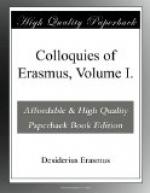Literae tuae magnopere me delectarunt.
Your Letters have delighted me very much._
Litertae.
Epistle, little Epistles, Writings, Sheets, Letters.
Magnopere.
After a wonderful Manner, wonderfully, in a greater, or great Manner, in a wonderful Manner, above Measure, very much, not indifferently (not a little) mightily, highly, very greatly.
Me.
My Mind, my Breast, my Eyes, my Heart, Christian.
Delectarunt.
They have affected, recreated, exhilarated with Pleasure, have been a Pleasure, have delighted, have bath’d me with Pleasure; have been very sweet, very pleasant, &c.
Now you have Matter, it is your Business to put it together: Let us try.
Ch. Thy Letters have very greatly delighted me. Thy Epistle has wonderfully chear’d me.
Au. Turn the Active into a Passive, then it will look with another Face. As, It can’t be said how much I have been chear’d by thy Writings.
Also by other Verbs effecting the same Thing.
I have received an incredible Pleasure from thy Writings. I have receiv’d very much Pleasure from your Highness’s Letter. Your Writings have brought me not an indifferent Joy. Your Writings have overwhelmed me all over with Joy. “But here you can’t turn these into Passives, only in the last, perfusus gaudio, as is commonly said, Pleasure was taken by me, Joy was brought, is not so commonly used, or you must not use so frequently.”
By Affido.
Thy Letter hath affected me with a singular Pleasure.
Change it into a Passive.
I am affected with an incredible Pleasure by thy Letter.
Thy little
Epistle has brought not a little Joy.
By Sum and Nouns Adjectives.
Thy Letters have been most pleasant to me many Ways. That Epistle of thine was, indeed, as acceptable, as any Thing in the World.
By Nouns Substantives.
Thy Letter was to us an unspeakable Pleasure. Your Letter was an incredible Pleasure to us.
Change it into a Negative.




